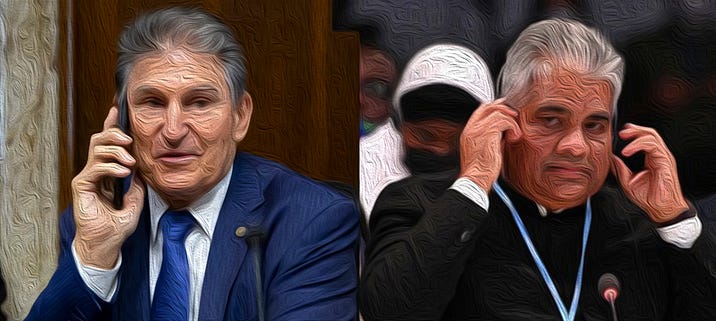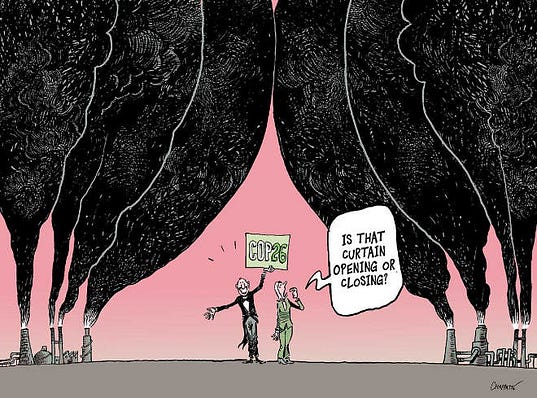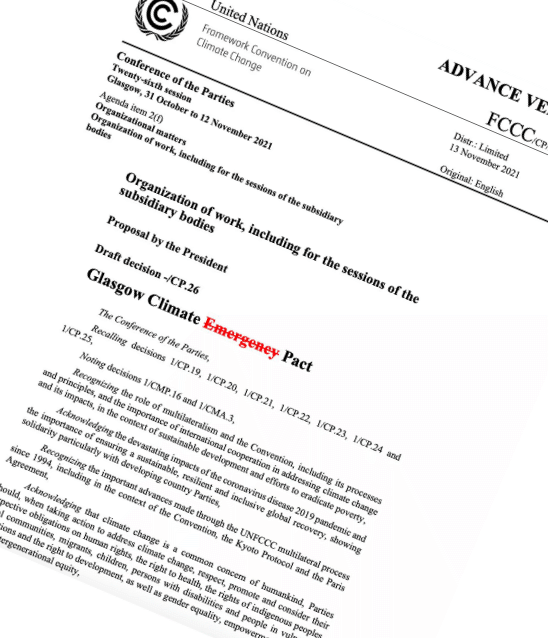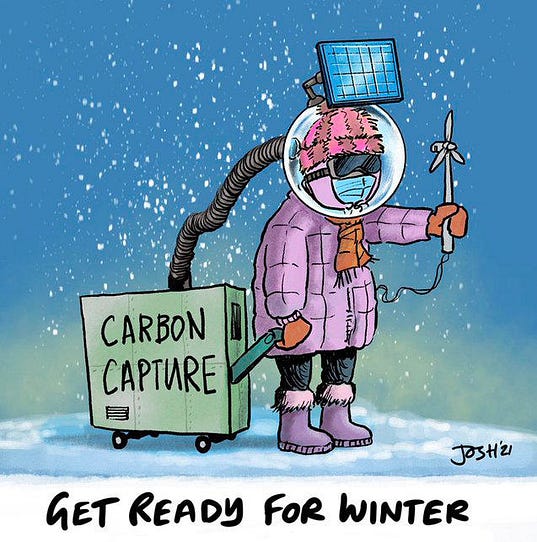The Great Pause Week 87: Casting the Net
"One of the rallying cries issuing from the street protests at COP26 in Glasgow is No Net Zero, Just Zero."
 |
Who calls the shots: US’s Joe Manchin, India’s Bhupender Yadav |
It is a nice thought but not very practical. Not everything that fossil fuels do for humanity can be quickly replaced with sunlight. There will necessarily be a long, painful period of adjustment while farmers go organic, chemical companies create and bring to market plant-based plastics and solvents, and planes, trucks and cargo ships electrify with some version of blue-green hydrogen. Transportation and the power grid are actually the easier parts of The Big Switch; the low-hanging fruit that can operate on the gases of decaying fruit.
The Net Zero slogan made popular over the past decade originally referred to national goals to defossilize infrastructures and reach carbon neutrality by some set date through a combination of conversion to renewables, demand reduction by better efficiencies and behaviors, and then purchases of “offsets” — agreements by private or national providers to remove greenhouse gases from the atmosphere and oceans — purchased on carbon markets that were, at least to begin with, uneven, experimental, and occasionally corrupt.
If you go to a website that calculates your carbon footprint, often there will be an option to purchase offsets and become personally “carbon-neutral.” Since the providers are most likely unregulated, all you really get when they swipe your credit card is a warm fuzzy feeling — not any real certainty that the carbon in that plastic card is actually being withdrawn from circulation. There are exceptions — companies that go the extra mile and do the non-compulsory due diligence to make sure enough trees have been planted, that they would not have been growing anyway, and that they didn’t just burn up in a wildfire or perish in droughts or floods. Perhaps they are putting solar arrays on schools or clean cookstoves in African villages. Great. But does it really cancel your footprint?
A few years ago I attended a reception in Toronto and found myself chatting one-on-one with the Vice President for Sustainability of one of the world’s largest oil companies. I asked her about her company’s climate policy. She said they planned to be carbon neutral. That conversation has lingered in my memory because I found it remarkable that removing millions of barrels of crude oil from deep underground could ever be thought to be carbon neutral. You would have to do such mental gymnastics to get there that somewhere off stage there would have to be wire supports manipulated by a team of gymnast puppeteers. As I looked for those hidden threads, what I saw was 9 parts greenwash and 1 part technological hubris. Taking hundred-million-year-old sunlight entrained and transformed when ancient forests or algae beds were subducted by geomorphic cataclysma, bringing that black goo to the surface at great expense, refining it into a clear liquid and then releasing it to the atmosphere to mingle and mix with the balanced photosynthetic budget of the planet, blowing out a delicate equilibrium that sustains the only known life in this corner of the galaxy, cannot possibly ever be carbon neutral. And yet, that is what the whole premise of Net Zero rests upon.
That is what the entire carbon trading regime that Article 6 of the Paris Agreement rests upon.
Two days ago I posted:
Switzerland has entered into agreements with Ghana, Senegal, Georgia, Vanuatu, Dominica and Thailand, separately, to establish and care for forested areas where none exist.
***
According to the Swiss NDC, by 2025, “a reduction of greenhouse gases by 35 percent compared to 1990 levels is anticipated.” Switzerland has a goal to reduce its emissions by 70 to 85 percent by 2050 compared to 1990, or 40 to 70 percent compared to 2010.
Suppose Dominica diligently plants half mangrove and half mountain forest to regenerate its island’s cover following the devastating impact of the 2019 hurricane. Averaged together, the mangroves and forests being planted will store away 20 tons per hectare per year. To sequester Switzerland’s one-year footprint would require Dominica to set apart, plant and protect 53.3 million hectares (205,792.45 square miles) of that island for 20 years. Unfortunately Dominica has a land area of only 290 square miles, so the Swiss government will need to apportion the sale among its other ITMO partners. Thailand has nearly 200,000 square miles and one of the longest coastlines in the world but it would also have difficulty sustaining Swiss offsets for very long. Eventually, it too may run out of land area to regenerate.
***
Multiply Switzerland’s planned offsets by one thousand. [Switzerland’s footprint is 0.001 of the global whole] Somewhere down the road there will be a real need for good accountants.
There is, I should caveat, a way to rebalance your personal budget, even while oil companies continue to blow out theirs. That way is through drawdown — removing CO2, methane and other greenhouse gases from the atmosphere, turning them back into mineral forms of carbon, and placing them back under ground. As an individual you can do this in a garden, even one on a balcony when you take out your compost. For oil companies or whole countries, it requires a circular economy that they are nowhere close to funding, researching, deploying and using — by any date. Boutique experiments are being carried out by small, underfunded startups using blue carbon, ocean CDR, BiRCS and BECCS, accelerated weathering, and DACCS. My own preference is biochar because it cascades so many different functions and can pay for itself without dicey offset subsidy. All of these techniques of carbon removal would need to scale many billionfold on unprecedented deadlines for carbon neutrality by 2030 to really achieve neutrality and for “Net Zero” to be something other than an advertising slogan.
Throughout these past 2 weeks I have been posting daily the happenings in Scotland to a Medium account that is metered and therefore inaccessible to many readers. This post is not metered, so let me pull out a few passages from these past few days, and then add a summary of where it finalized when the last gavel banged.
The delegates in Scotland all know that anything negotiated with President Biden can just as easily be undone by President Trump in 2024 from behind his prison bars. Maybe the prison will even provide him an Oval Office and Resolute Desk.
 They also know that Biden’s strings are held by big coal’s US Senator Joe Manchin. Similarly, the Paris Agreement’s future is now in the hands of Modi’s India, represented in Glasgow by Environment Minister Bhupender Yadav. Modi and Yadav said very plainly they have no plans to stop building new coal power infrastructure much before 2070, but might level off then if they were offered inducements like $100 billion per year to purchase renewable energy systems, starting now. That might seem a pretty outrageous, and fringe, position except that India found support from China, Australia, Brazil and South Africa.
They also know that Biden’s strings are held by big coal’s US Senator Joe Manchin. Similarly, the Paris Agreement’s future is now in the hands of Modi’s India, represented in Glasgow by Environment Minister Bhupender Yadav. Modi and Yadav said very plainly they have no plans to stop building new coal power infrastructure much before 2070, but might level off then if they were offered inducements like $100 billion per year to purchase renewable energy systems, starting now. That might seem a pretty outrageous, and fringe, position except that India found support from China, Australia, Brazil and South Africa. Nature doesn’t play politics. The year 2021 is now expected to qualify among the hottest seven in history, all of them recorded since 2014. There have been so many storms in the Atlantic this year that the National Hurricane Center has used up all 21 available names for only the third time in history. By 2070 some 3 billion people — one out of three persons — could be exposed to temperatures on par with the hottest parts of the Sahara today.
The Holocene Epoch provided humans a habitable planet with a very narrow mean annual temperature band of 11–15°C (52–59°F). That led us to evolve from mammals with long tails to making chalk and charcoal handprints on the walls of caves. A 3-degree rise would reset the temperature band to between 14 and 18°C. People will naturally migrate away from areas of 18 towards areas of 14.
This is why, in recent years, tens of thousands of people have fled Central American countries like Guatemala and Honduras, where temperature and rainfall changes have made it impossible to grow crops. Throughout the Indian Subcontinent, hundreds of thousands of people are displaced yearly by floods. Heat-related food shortages are driving the exodus in Syria, West Africa and the Sahel. In the Caribbean islands the driver is massive hurricanes. According to a World Bank report, more than 200 million people will migrate over the next three decades.
The refugee surges witnessed in recent years along the US southern border, into Turkey from West Africa and the Sinai, or into Europe from North Africa, are fly specks compared to the 200 million soon to arrive and demand legal asylum in the wealthy North. Putting them in cages or binding their hands and feet and dumping them into the river won’t do.
 Just before the final plenary closed the COP, leaving bittersweet tastes in the mouths of nearly all delegates — they had kept Paris alive but had compromised away many needed reforms — an even more bitter pill was delivered by Bhupender Yadav. In negotiations, the words, “accelerating efforts towards the phase-out of coal power and fossil fuel subsidies by 2030” had been replaced by “accelerating efforts towards the phase-out of unabated coal power and inefficient fossil fuel subsidies.” Now India wanted “phase-out” changed to “phase-down” which may seem like a minor wording change but what it really meant was coal power would never be eliminated, merely downsized. In order to go home and get some sleep, the plenary agreed, passing loopholes large enough to ride a hydrogen e-bus back to your hotel through..
Just before the final plenary closed the COP, leaving bittersweet tastes in the mouths of nearly all delegates — they had kept Paris alive but had compromised away many needed reforms — an even more bitter pill was delivered by Bhupender Yadav. In negotiations, the words, “accelerating efforts towards the phase-out of coal power and fossil fuel subsidies by 2030” had been replaced by “accelerating efforts towards the phase-out of unabated coal power and inefficient fossil fuel subsidies.” Now India wanted “phase-out” changed to “phase-down” which may seem like a minor wording change but what it really meant was coal power would never be eliminated, merely downsized. In order to go home and get some sleep, the plenary agreed, passing loopholes large enough to ride a hydrogen e-bus back to your hotel through..
The move was indicative of the entire document, whose name, after all, had been changed in Draft 13 from Glasgow Climate Emergency Pact to Glasgow Climate Pact. No emergency here, move along.
What I heard, from one formal closing statement to the next — G77 plus China, Small Island Nations, High Ambition Coalition, Indigenous Peoples, etc — was “grateful we were able to get consensus to keep 1.5 alive, and that the spirit of multilateralism continues, let’s hope we get farther next year.” Not exactly a rousing standing O.
Outside the plenary hall, Kumi Naidoo quoted the Sudanese American poet Emi Mahmoud (nom du twit: @EmiThePoet), “First you act, and then you have hope.” So now it is on to COP27 in Dar el Salam (Arabic: دار السلام “House of Peace”) and let’s win there.
___________________
The COVID-19 pandemic has destroyed lives, livelihoods, and economies. But it has not slowed down climate change, which presents an existential threat to all life, humans included. The warnings could not be stronger: temperatures and fires are breaking records, greenhouse gas levels keep climbing, sea level is rising, and natural disasters are upsizing.As the world confronts the pandemic and emerges into recovery, there is growing recognition that the recovery must be a pathway to a new carbon economy, one that goes beyond zero emissions and runs the industrial carbon cycle backwards — taking CO2 from the atmosphere and ocean, turning it into coal and oil, and burying it in the ground. The triple bottom line of this new economy is antifragility, regeneration, and resilience.
Help me get my blog posted every week. All Patreon donations and Blogger subscriptions are needed and welcomed. You are how we make this happen. Your contributions are being made to Global Village Institute, a tax-deductible 501(c)(3) charity I have been involved with since its inception in 1974. PowerUp! donors on Patreon get an autographed book off each first press run. Please help if you can.
#RestorationGeneration
“There are the good tipping points, the tipping points in public consciousness when it comes to addressing this crisis, and I think we are very close to that.”
— Climate Scientist Michael Mann, January 13, 2021.
Want to help make a difference while you shop in the Amazon app, at no extra cost to you? Simply follow the instructions below to select “Global Village Institute” as your charity and activate AmazonSmile in the app. They’ll donate a portion of your eligible purchases to us.
How it works:
1. Open the Amazon app on your phone
2. Select the main menu (=) & tap on “AmazonSmile” within Programs & Features
3. Select “Global Village Institute” as your charity
4. Follow the on-screen instructions to activate AmazonSmile in the mobile app






Comments